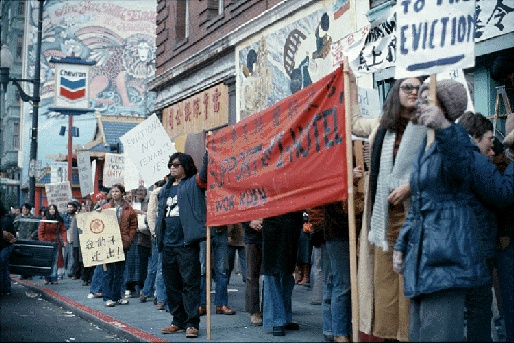Al Robles was born in 1930 and raised in the Filmore district of San Francisco. His works not only represented his sense of respect for the manong generation of the 1900s-1960s but also a sense of concern toward the present state of Filipino America itself. As an activist, Robles worked to fight the demolition of the I-Hotel, brought activists to the Delano Agbayani Village settlement and led trips to the Tule Lake and Manzanar concentration camps. Robles’ top concern was promoting the history and experiences of the past to young activists, Filipino or not. Through the use of poetry, oral histories and written stories, Robles attempted to bridge the cultural narratives of young and old Filipinos together.
 |
| Protestors outside the I Hotel |
Robles work seemed to reflect a concern that it is the responsibility of the younger generation to not just accept Filipino American history, but also to record and remember it for all its glories and unhappiness. Robles wanted his poetry to inform his readers and bring his perspective on history and community. Through many interviews with the aging bachelors of the manong generation, Robles used his literature to paint a picture of the Filipino American legacy. In his collection of poems Rappin with Ten Thousand Carabaos n the Dark, Robles writes of the manong experience for all its gloomy truths, at times using such verses as,
brown hands
unfolding
black flesh
dyin’ pimps
laid out cold
on piss streets
unfolding
black flesh
dyin’ pimps
laid out cold
on piss streets
Robles characterization of the manong experience brings to the foreground the importance of examining the past for all its miseries as well as pleasantries. In addition to recounting the Filipino American experience however, many of Robles’ works also seem to illustrate his sense not only as a Filipino American but also as an Asian American existing within a multiracial space of community. In one of his more famous works, “Winter Rain Yum Cha with Gin San,” Robles examines the “urban nomad” as a racially ambiguous (or perhaps free of race?) traveler as a product of both nature and the city and compares it to his own image of a drunken Buddha “clinging to the wind”,
Winter rain yum cha with Gin San
A fat, sloppy ragged, dirty, nose-
picking recluse, who hangs out at
Portsmouth Square all year-round.
A fat, sloppy ragged, dirty, nose-
picking recluse, who hangs out at
Portsmouth Square all year-round.
Dragonflies get all tangled up in
his thick black mountain hair
Knotted with pine cones
his thick black mountain hair
Knotted with pine cones
Robles died in May of 2009 relatively unknown in the mainstream American literary circle. Nonetheless his efforts at community building and preserving Filipino-American legacies will not be forgotten. His attempts at reconnecting past histories with the present generation should be carried on by activists today.


I like this a lot. My english improve.
ReplyDelete-Fao Zhu Dong